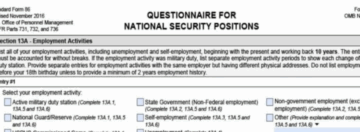PTSD Not an Excuse for Dishonesty on the SF-86

We all know PTSD is a serious concern for our returning Warfighters and veterans. Some common symptoms associated with PTSD are nightmares, increased anxiety, difficulty remembering or concentrating, mood swings, and reliving traumatic events. PTSD in and of itself is not a disqualifier for eligibility to hold a security clearance and the DoD has made much headway ensuring fair treatment and consideration is given for clearance holders and applicants who are diagnosed with it. However, as noted in a recent Defense Office of Hearing and Appeals case, it does not provide an excuse for the lack of honesty and candor during the security clearance process when you don’t provide required or accurate information about illegal drug use.
Even though a psychologist testified on behalf this applicant, stating that he believed the omissions’ were the result of PTSD, it was not enough to overcome the inconsistencies between the applicant’s answers on a previous public trust investigation, the current SF-86, and his subject interview with an investigator. The judge in the case was of the opinion that the applicant had not established a nexus between his PTSD and it causing him to omit or provide false answers regarding his drug use. Ironically, the applicant’s illegal drug use was mitigated due to the circumstances, frequency of use, and time elapsed. As is almost always the case, failure to provide truthful answers during the security clearance process (personal conduct) resulted in an unfavorable clearance eligibility decision.



Start the discussion